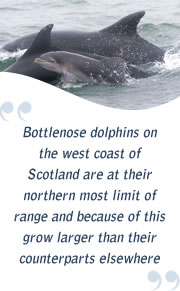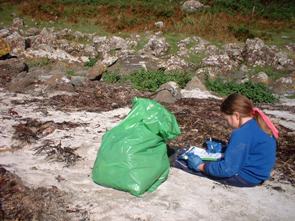Get Involved Index


Other Ways to Help
There are lots of things that you can do to improve the marine environment. Small changes really can make a big difference so find out below how you can help protect our seas and its wildlife.
Save Energy
Think about all of the appliances in your home and the energy they use. By making small changes around the home you can reduce your carbon footprint, help the environment and save money. Climate change will threaten marine life by increasing ocean temperatures. Evidence suggests that this has already started to affect the distribution of plankton and fish around the UK; cetaceans will have to adapt to changes in the distribution and availability of their prey species.
Top three actions:
- Switch to energy saving light bulbs, which use up to 80% less electricity than standard bulbs
- Turn off appliances instead of leaving them on standby and reduce your energy usage by around 8%
- Set your washing machine to a lower temperature when you can; as much as 90% of the energy used by your washing machine is to heat up the water, so avoid the hot cycles
Shopping
We are all probably aware of the terms ‘Fairtrade’ and ‘Organic’, but there are other things to remember when you are out shopping. The transportation of our groceries, many of which have flown thousands of miles before reaching our plates, causes significant carbon emissions and adds to the problem of climate change. Pesticides applied to crops wash into the sea and accumulate in the bodies of marine animals; the consequences of this are still being studied.
Seafood is healthy and full of essential vitamins and minerals, but it is important to be aware where your food has come from and how it was caught. Certain fishing techniques, such as pair trawling and the use of gill nets, are damaging to the environment because of the associated level of bycatch, which can include thousands of dolphins and porpoises. Trawling also causes damage to the seabed which takes time to recover. Over-fishing of target fish species has caused the collapse of fisheries around the UK and consequences within marine food chains.
It can be tempting to buy souvenirs such as shells and coral when you’re on holiday but they may have been collected unsustainably using damaging methods; you can be sure that they would be of more value alive in their natural environment.
Top three actions:
- Head down to your local farm shop or produce market for grocery products that have not flown thousands of miles to reach your plate; you’ll also be supporting local farmers and buying the freshest organic fruit and vegetables possible
- Buy seafood from sustainable, well-managed stocks that have been caught using methods that minimise impacts on the environment; consumer power can make a real difference so don’t be afraid to ask before you buy. Take a look at the Marine Conservation Society's Good Fish Guide (2.3MB)
- Say no to plastic bags and instead take your own reusable cotton or jute bags because even degradable plastic bags only break down into smaller pieces; plastic bags can end up in the sea and be accidentally swallowed by marine animals, especially turtles
Code of Conduct
Get the most out of an encounter with marine animals by following some simple guidelines. If you see cetaceans, basking sharks, turtles or other large animals whilst at sea, approach slowly and don’t get too close. It is important to maintain a steady and predictable course; don’t approach animals from behind or cut them off. Spend a reasonable amount of time observing the animals but move away carefully at the first signs of disturbance (these could include sudden evasive movements and tail slapping). It is an offence to intentionally or recklessly disturb any whale, dolphin, porpoise or basking shark (Wildlife and Countryside Act 1981; Nature Conservation (Scotland) Act 2004). If you are booking a wildlife boat trip, ask if they are WiSe accredited.
A visit to the beach is an excellent opportunity to explore the rich and colourful life around our coastline but don’t forget to stay safe and protect wildlife by following HWDT's Seashore Code (250KB).
Litter and Recycling
Litter that ends up in the sea comes from many sources: some will be blown from landfill sites, some will go overboard from ships and some is left behind on the beach. By disposing properly of your litter when you leave the beach, you can clean-up the appearance of the shoreline and protect marine animals; creatures such as cetaceans, seals and turtles can swallow and become entangled in litter, which can cause injury and death. Plastic bags and bottles were the most common litter item recorded from Silurian during 2006, and plastics are consistently the main litter items collected during Beachwatch, the Marine Conservation Society’s annual nationwide beach clean event. Find out more about the global problem of plastic in the seas on the Plastic Oceans website.
Top three actions:
- Take part in beach cleans to actively improve the coastal environment
- Buy products with little or no packaging and dispose of it properly; some packaging is now biodegradable
- Think about what you flush down the toilet because items such as cotton buds make their way into the sea and may harm marine creatures
Be Eco-Friendly
There are lots of ‘eco-friendly’ products available, but what do they really do for the environment? Most of the cleaning products that we use in our homes, from shower gel to laundry detergent, are washed down the drain and eventually end up in the sea. Compared with regular varieties, eco-friendly products contain less or no harmful toxic chemicals.





